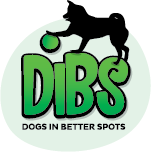When you adopt a DIBS dog, the expectation is that you will sign up for training (well…it’s more than an expectation: it’s actually in the adoption contract). We don’t hesitate to have veterinarians and groomers lined up to help with our pets. We likely have a dog walker or have connected with friends and family about helping out. Getting a trainer on hand is just as important, and the upfront investment will be worth it.
A too-common error happens on the first day and happens frequently, as the new family is very excited and they just want to love and pamper their pup. Often with rescue pups, we feel like we need to love them extra to make up for all the things that they may have missed out on before they were adopted. The problem is that unconditional love without clear boundaries may confuse the dog and it can lead to some major problems down the road. Read more about setting boundaries for your new dog here.
We have heard people comment on children that lack discipline. Don’t let your dog be like one of those children! And, yes, we know that raising kids is different from raising a dog, but there are some underlying principles that remain the same. (Read this cute article on the topic!)
Why does DIBS insist on training?
- Communication – training is for both the dog and the people. Regardless of your experience level, you haven’t developed communication with “this” dog.
- Starting off right – by signing up for training in the first few weeks you will help eliminate bad habits (yours and the dog’s). When you bring your dog home on the first day, you are starting your journey together. How you do this will make your life easier or more challenging. Done right, your dog should be the worst version of himself on Day One. There may be accidents in the house or reactions that you don’t expect, but how you deal with them together will make all the difference.
- A resource – there may be a day when you need help, and by having hired a trainer in the early days, you have a pro on speed dial. And, even better, they will know your dog! More on this topic here.
Who to hire?
Just like you did with your vet, do your research. Ask around. Just be sure that it is a true professional please, not your aunt’s cousin’s neighbour who has “always been good with dogs”!
You will learn buzzwords like “positive reinforcement”, “alpha”, “balanced”, and more. You will have conversations with people that are polarized on the topic. Every dog is different and every trainer is different, even within the same training methodology. You need to do your research and find what resonates for you, and educate yourself. Think of how you raise your kids, or how the guy down the street raises his, or how your parents raised you. What was the norm at one point in time, may not be the current approach, or get the best results. What may have worked with one kid might not work as well with another.
When talking to potential trainers, have your list of questions ready. It is important that you actually like the trainer personally, as you will get guidance from them and a good relationship will yield better results. Some things to ask your trainer candidates:
- Can you explain your training method? What happens when the dog performs an undesirable behaviour?
- How long have you been training dogs?
- Have you ever trained rescue dogs before?
- What type of equipment do you use and will I have to buy anything?
- Do you guarantee any results?
What type of training options?
There are different types of training available for you and your pup. Do your research, and check with your pup’s foster parent to see which type of training structure your new dog (and you) may need.
Basic: Some dogs will be fine with a standard (pet store type) group training. This is a great training introduction for easy dogs.
Private: This will be 1:1 training for both you and your dog. The right trainer will guide you and your behaviour to bring out the best in your dog.
Board & Train: This is great when your dog needs more structure than you do. Your dog will go through a bit of a “boot camp” to re-train some behaviours.
Who do you want your dog to be?
Polite – a trainer can help!
Good on walks – a trainer can help!
Respectful in your home (kitchen included) – a trainer can help!
Confident in new situations – a trainer can help!
Good with other dogs – a trainer can help!
A good listener – a trainer can help!
Able to do a few tricks – a trainer can help!
christine@dibsrescue
